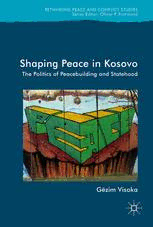
Shaping Peace in Kosovo : The Politics of Peacebuilding and Statehood PDF
Preview Shaping Peace in Kosovo : The Politics of Peacebuilding and Statehood
fl Rethinking Peace and Con ict Studies Series Editor Oliver P. Richmond University of Manchester United Kingdom This agenda-setting series of research monographs, now more than a decade old, provides an interdisciplinary forum aimed at advancing inno- vative new agendas for approaches to, and understandings of, peace and conflict studies and International Relations. Many of the critical volumes the series has so far hosted have contributed to new avenues of analysis directly or indirectly related to the search for positive, emancipatory, and hybrid forms of peace. New perspectives on peacemaking in practice andintheory,theirimplicationsfortheinternationalpeacearchitecture,and different conflict-affected regions around the world, remain crucial. This series’contributionsoffersboththeoreticalandempiricalinsightsintomany of the world’s most intractable conflicts and any subsequent attempts to buildanewandmoresustainablepeace,responsivetotheneedsandnorms ofthosewhoareitssubjects. More information aboutthisseries at http://www.springer.com/series/14500 GëzimVisoka Shaping Peace in Kosovo The Politics of Peacebuilding and Statehood GëzimVisoka SchoolofLawandGovernment DublinCityUniversity Dublin,Ireland RethinkingPeaceandConflictStudies ISBN978-3-319-51000-2 ISBN978-3-319-51001-9(eBook) DOI10.1007/978-3-319-51001-9 LibraryofCongressControlNumber:2017930928 ©TheEditor(s)(ifapplicable)andTheAuthor(s)2017 This work is subject to copyright. All rights are solely and exclusively licensed by the Publisher,whetherthewholeorpartofthematerialisconcerned,specificallytherightsof translation, reprinting, reuse of illustrations, recitation, broadcasting, reproduction on microfilms or in any other physical way, and transmission or information storage and retrieval,electronicadaptation,computersoftware,orbysimilarordissimilarmethodology nowknownorhereafterdeveloped. Theuseofgeneraldescriptivenames,registerednames,trademarks,servicemarks,etc.inthis publicationdoesnotimply,evenintheabsenceofaspecificstatement,thatsuchnamesare exemptfromtherelevantprotectivelawsandregulationsandthereforefreeforgeneraluse. Thepublisher,theauthorsandtheeditorsaresafetoassumethattheadviceandinformation in this book are believed to be true and accurate at the date of publication. Neither the publishernortheauthorsortheeditorsgiveawarranty,expressorimplied,withrespectto thematerialcontainedhereinorforanyerrorsoromissionsthatmayhavebeenmade.The publisherremainsneutralwithregardtojurisdictionalclaimsinpublishedmapsandinstitu- tionalaffiliations. Coverillustration:PhotobyGëzimVisoka Printedonacid-freepaper ThisPalgraveMacmillanimprintispublishedbySpringerNature TheregisteredcompanyisSpringerInternationalPublishingAG Theregisteredcompanyaddressis:Gewerbestrasse11,6330Cham,Switzerland To myparents, Tahirand NexhmijeVisoka,for survivingthe violent conflictand enduringthe ungovernablepeace. A CKNOWLEDGEMENTS I am in debt to the many people who have helped me in different ways while writing this book. Special thanks go to Oliver P. Richmond for inspiringmetopursuethisresearchandforprovidingcontinuoussupport throughout the process. My wife, Grace Bolton-Visoka, deserves special recognitionforhereternalpatience,understanding,supportandinsightful commentsonthisbook.Whilepreparingthismanuscript,I greatlybene- fited from conversations with colleagues at Dublin City University, and elsewhere,whoprovidedmewiththe support andspacetocomplete this intense project on time. I am, in particular, grateful to Professor John Doyle, DCU’s Institute for International Conflict Resolution and Reconstruction (IICRR), the School of Law and Government, and the FacultyofHumanitiesandSocialSciencesforprovidingfinancialsupport. Writing a book on peacebuilding and statehood in Kosovo from a local critical perspective requires extensive engagement with a broad range of interlocutors working with civil society groups, government and public institutions, international missions and organisations, and public univer- sities.Iamgratefultomanyofyou,whomIcannotlistexhaustivelyhere, for their thoughtful and engaging conversations, and for their assistance duringmymanyvisitstoKosovo,whichshapedthisbook.Idedicatethis booktomyparents,TahirandNexhmijeVisoka,forsurvivingtheviolent conflict andenduring theungovernable peace inKosovo. vii C ONTENTS 1 Intervention,Peace, andthe State 1 2 FluidInterventionism andthe Politics ofPeacebuilding 33 3 ThePolitics of Statehoodandthe Ungovernability of Peace 71 4 LocalResistanceand the Politicsof Self-Determination 113 5 CivilSociety andPeace Formation 147 6 Peaceas Normalisation 183 7 TheQuest for anEmancipatory Peace 221 Index 255 ix L A IST OF BBREVIATIONS AAK AlliancefortheFutureofKosovo CSDP CommonSecurityandDefensePolicy EEAS EuropeanExternalActionService EU EuropeanUnion EULEX EuropeanUnionRuleofLawMissioninKosovo ICO InternationalCivilianOffice ICR InternationalCivilianRepresentative KFOR KosovoForce(NATO) KLA KosovoLiberationArmy LDK DemocraticLeagueofKosovo LVV LëvizjaVetëvendosje NATO NorthAtlanticTreatyOrganisation OSCE OrganisationforSecurityandCooperationinEurope PDK DemocraticPartyofKosovo PISG ProvisionalInstitutionsofSelf-Government SAA StabilisationandAssociationAgreement SITF SpecialInvestigativeTaskForce SRSG SpecialRepresentativeoftheSecretary-General UN UnitedNations UNMIK UnitedNationsInterimAdministrationMissioninKosovo UNOSEK United Nations Office of the Special Envoy for the Future Status ProcessforKosovo xi CHAPTER1 Intervention, Peace, and the State OVERVIEW This book explores the prospects of building peace after violent con- flict in an ethnically divided society, which has struggled to form an independent state under protracted and fluid international intervention and tutelage. While international attention is currently focused on transnational terrorism and hybrid security threats emanating from intensified rivalry among global and regional powers, civil wars and ethnic conflicts remain an important feature of the international secur- ity agenda. International attention remains especially significant for societies that have experienced international mediation, intervention, and post-conflict reconstruction while struggling to overcome the legacies of conflict and establish a sustainable peace. There is no better case than Kosovo to evaluate the suitability of peacebuilding interven- tions, the unintended outcomes of statebuilding efforts, and the local backlash to international interventions. Kosovo has attracted unprece- dented international attention over the past two decades. Kosovo has also been cited as an example of ethnic cleansing, international inter- vention, post-conflict peacebuilding and statebuilding, and contested statehood. Kosovo has become the place where humanitarian interven- tion gained its peak international support, where state sovereignty changed its meaning, and where the doctrine of the responsibility to protect took precedence over territorial integrity. Most significantly, Kosovo has challenged the limits of liberal internationalism and has ©TheAuthor(s)2017 1 G.Visoka,ShapingPeaceinKosovo,RethinkingPeace andConflictStudies,DOI10.1007/978-3-319-51001-9_1
